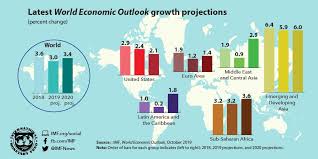The Dynamics of Global Economic Trends
In today’s interconnected world, global economic trends play a crucial role in shaping the financial landscape of nations and impacting the lives of individuals worldwide. From trade wars to technological advancements, a myriad of factors influence the ebb and flow of the global economy.
Key Factors Driving Global Economic Trends
One significant trend is the shift towards digitalisation and automation across industries. Technological innovations such as artificial intelligence, blockchain, and big data are revolutionising business operations and creating new opportunities for growth.
Moreover, geopolitical tensions and trade disputes between major economies have led to uncertainties in international markets. Tariffs, sanctions, and political decisions can have far-reaching implications on global trade flows and economic stability.
The Impact on Developing Economies
Developing economies often bear the brunt of global economic fluctuations. While some countries experience rapid growth due to investments in infrastructure and emerging industries, others struggle with debt burdens and lack of access to capital.
Furthermore, environmental concerns are increasingly shaping economic policies worldwide. The push for sustainable practices and renewable energy sources is not only a moral imperative but also a strategic move towards long-term economic stability.
Adapting to a Changing Economic Landscape
To thrive in an ever-evolving global economy, businesses and governments must be agile in their decision-making processes. Embracing innovation, fostering collaboration, and prioritising sustainable practices are essential steps towards navigating the complex web of global economic trends.
As we look towards the future, understanding these trends and their implications is key to making informed choices that drive progress on both a local and global scale.
Understanding Global Economic Trends: Key Questions Answered
- What are the current global economic trends?
- How do trade wars impact global economic trends?
- What role does technology play in shaping global economic trends?
- What are the implications of geopolitical tensions on the global economy?
- How do environmental factors influence global economic trends?
- What strategies can businesses adopt to adapt to changing global economic trends?
What are the current global economic trends?
Inquiring about the current global economic trends is a common query that reflects a keen interest in understanding the dynamic forces shaping the world’s financial landscape. As of now, key trends include the impact of ongoing trade disputes between major economies, the accelerated pace of digital transformation across industries, and the increasing focus on sustainable practices and renewable energy sources. These trends highlight the interconnected nature of today’s global economy and underscore the importance of staying informed and adaptable in navigating the complexities of international markets.
How do trade wars impact global economic trends?
Trade wars have a profound impact on global economic trends, creating ripples that are felt across industries and borders. When countries engage in trade disputes by imposing tariffs or restrictions on imports, it disrupts established supply chains, raises costs for businesses and consumers, and can lead to a reduction in international trade. This can result in economic uncertainty, decreased investor confidence, and slower global growth. Additionally, trade wars can strain diplomatic relations between nations and escalate into broader geopolitical tensions. Understanding the intricate ways in which trade wars influence the global economy is crucial for policymakers, businesses, and individuals navigating the complexities of today’s interconnected markets.
What role does technology play in shaping global economic trends?
Technology plays a pivotal role in shaping global economic trends by driving innovation, transforming industries, and reshaping the way businesses operate on a global scale. From automation and artificial intelligence to digital platforms and data analytics, technological advancements have revolutionised traditional business models and opened up new opportunities for growth and efficiency. The integration of technology into various sectors has not only accelerated productivity but has also facilitated cross-border trade, communication, and collaboration. As we navigate the complexities of the modern economy, technology continues to be a driving force behind the evolution of global economic trends, influencing everything from consumer behaviour to supply chain management.
What are the implications of geopolitical tensions on the global economy?
Geopolitical tensions have significant implications on the global economy, shaping trade dynamics, investment patterns, and market confidence. Uncertainties arising from political conflicts or trade disputes between nations can lead to disruptions in supply chains, fluctuations in commodity prices, and increased market volatility. Investors may become cautious, affecting capital flows and business decisions. Moreover, geopolitical tensions can influence currency exchange rates and interest rates, impacting the overall economic stability of countries. In a highly interconnected world, understanding and managing these implications are crucial for policymakers, businesses, and individuals navigating the complexities of the global economy.
How do environmental factors influence global economic trends?
Environmental factors play a significant role in shaping global economic trends. The impact of climate change, natural disasters, and resource scarcity can have far-reaching consequences on economies worldwide. For instance, extreme weather events disrupt supply chains, leading to production delays and increased costs for businesses. Additionally, the shift towards sustainable practices and renewable energy sources is driving investment in green technologies and creating new economic opportunities. Governments and businesses are increasingly recognising the importance of environmental stewardship in fostering long-term economic growth and resilience in the face of global challenges.
What strategies can businesses adopt to adapt to changing global economic trends?
In response to the frequently asked question about strategies for businesses to adapt to changing global economic trends, it is essential for companies to embrace flexibility and innovation. Businesses can stay ahead by diversifying their markets, products, and services to mitigate risks associated with economic fluctuations. Investing in technology and digital transformation can enhance operational efficiency and competitiveness in a rapidly evolving global landscape. Moreover, fostering strategic partnerships and collaborations with other businesses can provide access to new markets and resources, enabling companies to navigate uncertainties and seize opportunities presented by shifting economic trends. By staying agile, proactive, and forward-thinking, businesses can position themselves for sustainable growth and success in the face of dynamic global economic challenges.

